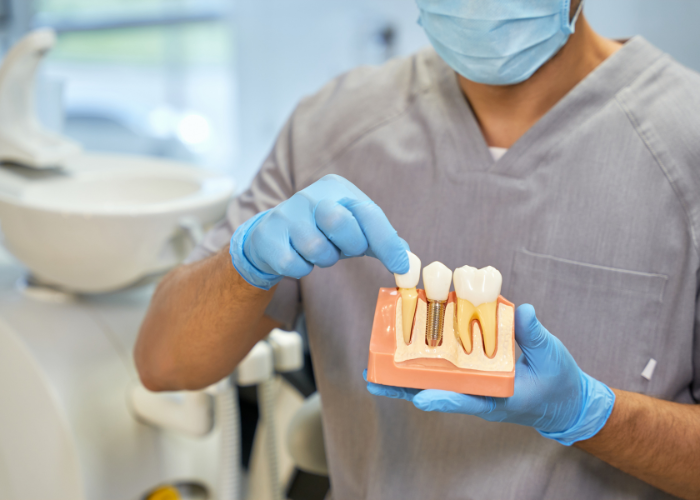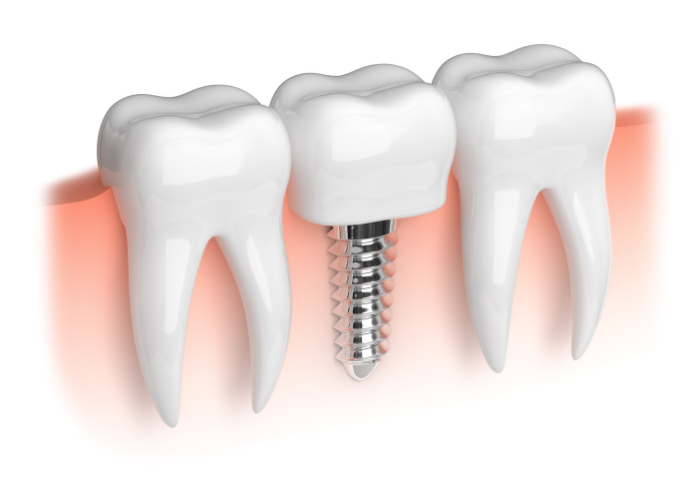Dental implant therapy has dramatically helped many people who are missing some or all of their teeth.
Not all dentists are trained to do standard Dental Implants or mini implants, and many times it is possible that more than one dental specialist will be involved in the process to place the implant, and then the restoration (crown).
At Coeur d'Alene Dental Center, in most cases the entire implant process can be taken care of in our CDA dental office.
An implant is an artificial object that replaces a missing body part. An implant is placed inside the body and acts almost like the missing body part. Two common examples of implants are a hip joint replacement and a shoulder joint replacement.
When natural teeth are missing from the mouth, artificial substitutes to replace the root portion of the teeth are put into the bone and gums of the mouth. Replacement teeth are then fixed onto these new roots. Dental implants is a long-lasting solution for replacing missing teeth, allowing people to smile, speak, and chew comfortably. At CDA dental office, we provide comprehensive implant dentistry to replace one or multiple missing teeth, restore your beautiful smile.

Dental implants are made from a biocompatible material named titanium. The implants fuse directly with jawbone, creating a sturdy foundation for crowns, bridges, or full-arch restorations.
Dental implants are designed to look, feel, and function just like your natural teeth.
When teeth are missing, there is the possibility of bone loss. Bone loss can result in a sunken facial appearance over time. Dental implants in Coeur d' Alene, ID will help maintain bone density and facial contours.
Having a complete smile makes a big difference in how you feel about yourself. Dental implants give many of our patients their confidence back, letting them smile naturally and enjoy everyday moments without worry.
If you are missing one tooth or multiple teeth, we can replace the missing teeth with dental implants. First, there are a few very important factors that must be considered. Experiments and practical experience have shown that implants work best when there is enough dense, healthy jaw-bone in the mouth that will support an implant.
Healthy, disease-free gum tissues are also necessary. The long-term success of a dental implant depends upon keeping the gums and bone around the implant healthy. People who have implants must keep them clean and should return regularly to their dentist for check-ups, because any problems that might threaten the health of the implant must be corrected as soon as possible.

One of the biggest advances in dentistry in the past 40 years has been the development and use of dental implants. Dental implants are medical devices that replace the root portion of missing natural teeth. If a permanent tooth has been lost due to accident, injury or disease, an implant is a popular and effective solution. Implants are effective in many situations to replace teeth or even help anchor removable dentures.
When used to support a removable denture, usually two to six implants are placed in the jaw. Often times the patients existing denture can be used with simple adjustments and then attached to the implants. This results in a very secure overdenture, improving the patient’s confidence in speaking, eating and wearing their denture.
Having problems stabilizing and wearing your lower denture? Well we have a solution for you. More and more of our patients are choosing to secure their lower denture with mini implants.
Mini implants are smaller forms of our traditional sized implants which are usually used to replace missing teeth. Mini implants have an advantage for denture patients whom may have worn dentures for many years because of their small size, ease of placements and lower cost. A person who has worn dentures for many years has more than likely lost much of the boney support of their jaw and this results in a loose, ill fitting lower denture. Adding 4-6 mini implants can give the denture wearer the comfort, confidence and security they need to wear their lower denture proudly.
If you have a lower denture and would like more support, give us a call for a free consultation today.
After your dentist has examined you and before you make any decision on implant treatment, you must consider cost. Just like any complicated and time-consuming medical or dental procedure, implant treatment is moderately expensive. You should be aware of all the costs involved. If you are to be treated by a team of dentists, make sure that you receive cost estimates from each one involved. For example, if an oral surgeon will be placing the implants into your jaw and your personal dentist is going to make the restoration to replace the teeth, you should get estimates form both.
A. Unlike dentures or bridges, implants replace the tooth root as well as the visible crown. That means they feel and function like natural teeth, and they help prevent bone loss in the jaw. Many patients also find that implants are easier to maintain and last much longer than other options.
A. Treat them like your natural teeth—brush twice a day, floss daily, and keep up with your routine cleanings. Using a soft-bristled toothbrush and non-abrasive toothpaste will also help protect the implant crown.
A. With advances in the science of implant dentistry, you can now expect that most implants will function indefinitely. However, like any dental restoration, the teeth may wear or break and need to be repaired or replaced.
A. The only way to know for sure is to come in for an exam. We’ll check your gums, take X-rays, and see how much bone you have to work with. Most people are candidates, but if you’ve lost a lot of bone or have certain health concerns, we may need to look at other options or do a bone graft first.
A. Not really. The surgery is done with numbing so you don’t feel pain during the procedure. Afterwards, it’s more like soreness or tenderness for a few days—similar to having a tooth pulled. Most of our patients say it’s much easier than they expected.
A. They can, if you care for them. On average, implants last decades, and many last the rest of a person’s life. Smoking, grinding your teeth, or not keeping up with dental hygiene can shorten their lifespan.
A. Yes, both can make implants less successful. Smoking slows down healing, and grinding puts extra pressure on the implant. If you grind your teeth, we’ll usually suggest a nightguard to protect your smile.
A. Very successful. Nationwide, the success rate is above 95%. As long as your gums and bone are healthy and you keep up with your oral care, implants have an excellent track record.
A. You’ll want someone with experience, good communication, and a track record of successful results. At Coeur d’Alene Dental Center, we walk you through each step, explain your options clearly, and make sure you feel confident in your care.
A. The cost of dental implants varies case by case. It will depend on how many teeth we will need to replace and if additional dental procedures are needed. Please call us at 208-667-7461 to schedule a free consultation, and we’ll be happy to give you an estimate of the total cost.
A. Yes, we do. We offer flexible payment plans for any budget. We use Cherry for flexible payment plans. Please refer to our Payment Plans page for more details.

Implants are a relatively new type of dental treatment. Today they appear to be a very successful answer to the problem of missing teeth. Your dentist will discuss with you how dental implant may benefit your particular case. Successful implant treatment has dramatically improved the quality of life for many people. With proper planning and care, implants can be an excellent answer to the problems associated with missing natural teeth. If you would like to learn more about dental implants, please give our office a call at 208-667-7461 for a free consultation.